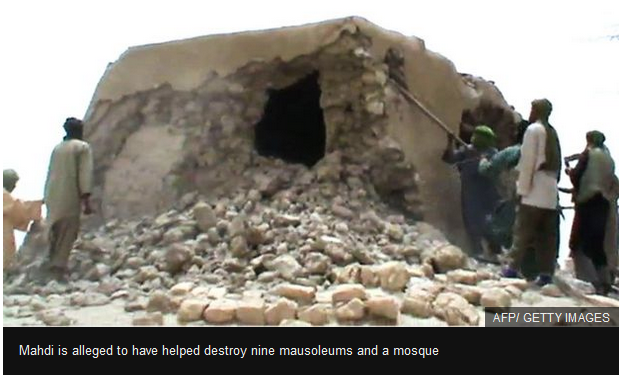An Islamist militant has admitted
destroying cultural sites in Timbuktu, Mali, in a landmark trial at the
International Criminal Court (ICC).
Ahmad al-Faqi al-Mahdi said he was "really sorry" for his actions and asked for forgiveness.He was accused of leading rebel forces who destroyed historic shrines at the world heritage site in 2012.
It is the first time that the court in The Hague has tried a case of cultural destruction.
It is also the first time a suspected Islamist militant has stood trial at the ICC and the first time a suspect has pleaded guilty.
Prosecutors said Mahdi was a member of Ansar Dine, an Islamist group that occupied Timbuktu for months.
Islamists regard the shrines and the city's ancient manuscripts, covering everything from history to astronomy, as idolatrous.
Court documents describe Mahdi as a religious scholar who directed fighters to wreck several sites with pickaxes and chisels after failing to deter locals from praying at them.
He was charged with war crimes over the destruction of nine mausoleums and a mosque.
Pleading guilty, he said: "I am really sorry, I am really remorseful, and I regret all the damage that my actions have caused.
"I would like to give a piece of advice to all Muslims in the world, not to get involved in the same acts I got involved in, because they are not going to lead to any good for humanity," he added
Given his guilty plea the trial will probably be over by the end of this week. He faces a maximum sentence of 30 years in jail.
Nine victims are later due to share their experiences in court.
Human rights groups say their presence is especially significant in demonstrating how the destruction of cultural heritage not only harms buildings but tears through the social, cultural and historical fabric of communities.
At the time, Unesco said the attack on the shrines of local saints was "tragic news for us all".
Timbuktu is famous for its distinctive mud and wood architecture. It was a centre of Islamic learning between the 13th and 17th centuries and was added to the Unesco world heritage list in 1988.
Ansar Dine, an extremist militia with roots in the nomadic Tuareg people, has ties to al-Qaeda. It was eventually driven out of Mali in a French-led intervention.
The court has previously heard that Mahdi, a former teacher aged about 40, was a "zealous member" of the militia. He is alleged to have been the head of the section that enforced strict Islamic law in Timbuktu.
Treasures of Timbuktu
- Timbuktu was a centre of Islamic learning from the 13th to the 17th Centuries
- 700,000 manuscripts had survived in public libraries and private collections
- Books on religion, law, literature and science
- Added to Unesco world heritage list in 1988 for its three mosques and 16 cemeteries and mausoleums
- They played a major role in spreading Islam in West Africa; the oldest dates from 1329
- Islamists destroyed mausoleums after seizing the city in April 2012















0 comments:
Post a Comment